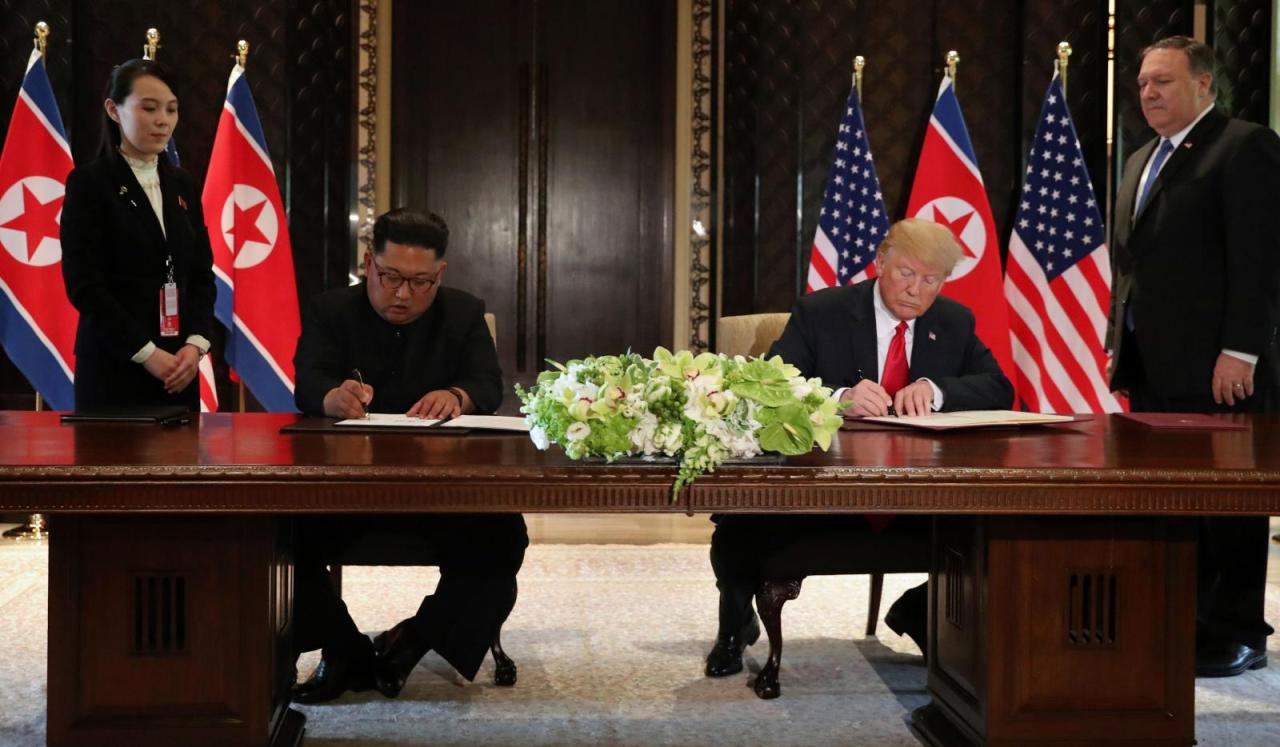[News analysis] US, North Korea likely to discuss security guarantees in upcoming nuke talks
By Park Han-naPublished : Oct. 2, 2019 - 16:43
The US and North Korea have finally confirmed they will resume nuclear diplomacy within days. The big question is whether the two sides will come to the negotiating table with acceptable new proposals to make progress in the denuclearization process that has stalled due to differences in their positions.
On Tuesday, North Korea disclosed the date for the working-level dialogue, which was supposed to take place in mid-July. US State Department spokeswoman Morgan Ortagus later confirmed the talks, which she said would happen “within the next week.”
On Tuesday, North Korea disclosed the date for the working-level dialogue, which was supposed to take place in mid-July. US State Department spokeswoman Morgan Ortagus later confirmed the talks, which she said would happen “within the next week.”

No venue for the upcoming meeting was specified, though there have been speculations it could take place in the Swedish capital Stockholm.
North Korea’s chief nuclear negotiator Kim Myong-gil is expected to lead the North’s team of negotiators at the talks, while Stephen Biegun, the US special representative for North Korea, will head the US team.
Ahead of the resumption of talks, North Korea’s Foreign Ministry conducted a personnel reshuffle.
Kim Kye-gwan, who led the six-party talks in the 2000s, has returned as a Foreign Ministry adviser, and Jo Chol-su was newly appointed to lead the Foreign Ministry’s North America Department.
Washington and Pyongyang are returning to the negotiating table three months after US President Donald Trump’s impromptu meeting with North Korean leader Kim Jong-un at Panmunjom in the Demilitarized Zone on June 30.
The possibility of the next Trump-Kim summit will depend on the degree to which the working-level negotiators of the two countries are able to resolve their differences on how to achieve the denuclearization of the Korean Peninsula and what should be offered by the US as corresponding measures.
Pyongyang has demanded that the US come up with a “new calculation method” before year-end, seeking a phased approach to disarmament in order to build trust and reach the goal of denuclearization. The North has also called for the Trump administration to provide security guarantees and relief from sanctions.
Meanwhile, South Korean Foreign Minister Kang Kyung-wha said Wednesday that she expects “both sides will come to the dialogue with a more flexible position” and that their discussion could include security guarantee issues.
Attracting attention is Washington’s “new method” mentioned by Trump to nail down the denuclearization process, which has gotten only as far as a vague agreement between the two leaders at their first summit in Singapore in June last year.
The North and the US will first work on identifying a common definition of denuclearization at the planned meeting, South Korea’s chief nuclear negotiator Lee Do-hoon said at a parliamentary audit.
The challenge for working-level talks is coming up with a negotiated road map and verification mechanisms for progress from stage to stage, according to Leif-Eric Easley, a professor at Ewha University.
“A deal that trades sanctions relief for a freeze in the production of nuclear material makes sense if it allows for international inspectors on the ground and includes sanctions snapback provisions in case North Korea is caught cheating,” he said.
A snapback mechanism refers to relief from certain sanctions that could be immediately restored if the North were to resume nuclear activities.
Some experts expect North Korea’s mainstay Yongbyon nuclear complex to be put on the negotiating table again. In February, the North proposed to shut down the nuclear facility in exchange for sanctions relief. The US rejected the offer.
“Even if the US gives up on a comprehensive deal, it will seek to freeze all nuclear material production facilities, including Yongbyon, in the first stage and demand measures to report and verify them in the next stage,” said Park Won-gon, a professor at Handong University.
By Park Han-na (hnpark@heraldcorp.com)



![[Exclusive] Korean military set to ban iPhones over 'security' concerns](http://res.heraldm.com/phpwas/restmb_idxmake.php?idx=644&simg=/content/image/2024/04/23/20240423050599_0.jpg&u=20240423183955)

![[Graphic News] 77% of young Koreans still financially dependent](http://res.heraldm.com/phpwas/restmb_idxmake.php?idx=644&simg=/content/image/2024/04/22/20240422050762_0.gif&u=)



![[Pressure points] Leggings in public: Fashion statement or social faux pas?](http://res.heraldm.com/phpwas/restmb_idxmake.php?idx=644&simg=/content/image/2024/04/23/20240423050669_0.jpg&u=)










